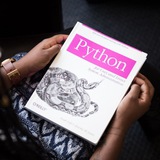Python from scratch
by University of Waterloo
0. Introduction
1. First steps
2. Built-in functions
3. Storing and using information
4. Creating functions
5. Booleans
6. Branching
7. Building better programs
8. Iteration using while
9. Storing elements in a sequence
10. Iteration using for
11. Bundling information into objects
12. Structuring data
13. Recursion
https://open.cs.uwaterloo.ca/python-from-scratch/
#python
by University of Waterloo
0. Introduction
1. First steps
2. Built-in functions
3. Storing and using information
4. Creating functions
5. Booleans
6. Branching
7. Building better programs
8. Iteration using while
9. Storing elements in a sequence
10. Iteration using for
11. Bundling information into objects
12. Structuring data
13. Recursion
https://open.cs.uwaterloo.ca/python-from-scratch/
#python
👍5❤4
Why should you learn Python?
- simple yet powerful
- versatile
- clean
- beginner friendly
- tremendous job opportunities
- high demand
- readability
- awesome community
- awesome ecosystem
- web development
- machine learning
- simple yet powerful
- versatile
- clean
- beginner friendly
- tremendous job opportunities
- high demand
- readability
- awesome community
- awesome ecosystem
- web development
- machine learning
👍8❤2
👍2
9 tips to improve your code:
- Declare variables close to usage
- Functions do 1 thing
- Avoid long functions
- Avoid long lines
- Don't repeat code
- Use descriptive variable/function names
- Use few arguments
- Simplify conditions (return age >17;)
- Remove unused code
- Declare variables close to usage
- Functions do 1 thing
- Avoid long functions
- Avoid long lines
- Don't repeat code
- Use descriptive variable/function names
- Use few arguments
- Simplify conditions (return age >17;)
- Remove unused code
👍13🤩5❤3👏1
Without errors, No-one can become a good programmer.
Errors are the most important phase of learning to code.
Errors are the most important phase of learning to code.
👍15❤4
